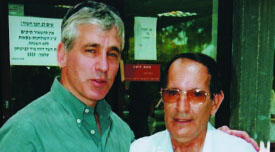New Frontiers

(L-R) Dr. Eytan Mor with one of his liver transplant recipients, Mr Amzaleg Hanania
The director of the Department of Organ Transplantation at Rabin Medical Center, Professor Eytan Mor, recently visited New York City and spoke to American Friends of Rabin Medical Center supporters of the pioneering work in organ transplantation.
Rabin Medical Center conducts the majority - over 60 percent - of organ transplants in Israel. The statistics are impressive. From 1982-2004, Rabin Medical Center conducted:
- 2045 kidney transplants, 265 of them on children
- 32 kidney/pancreas for Type II diabetes
- 242 liver transplants, 50 of them on children
- 106 lung transplants
- 93 heart transplants
Rabin Medical Center is the first hospital in Israel to achieve a crossover kidney transplant where two partners exchange kidneys because their own donor was not a compatible blood type. Doctors also completed the first living-relative liver transplants - parent to child and adult to adult; the first successful split liver transplant operation - a liver is split into two parts and is shared between a child and an adult; and the first domino transplant - a block of heart-lung is transplanted in one patient and the removed heart is transplanted in another patient.
Prof. Mor pointed to new frontiers in embryonic tissue transplants and transformed hepatocytes to islet cells. New embryonic tissues are grown in animals and then transplanted into humans with the hope of self-regeneration. Also, great strides are occuring in immune suppression and drug protocols.
The long-range goals of Rabin Medical Center are to increase the number of liver transplants, and to improve pre-transplant patient screening and post-transplantation drug protocols.
Related Articles
Special Maternity Lounge for New Mothers
Approximately 9,000 babies are born at the Helen Schneider Hospital for Women yearly and about seven percent of these are premature deliveries where the baby is still hospitalized after the mother goes home.
The Wonders of The Pomegranate
It is not surprising that scientists in Israel were the first group to conduct research on the health benefits of pomegranates.
Rabin Medical Center Nursing Scholarships
Current scholarship recipient, Maria Portnoy, demonstrates the enormous impact of your generosity over the years. Born in Ukraine, Maria immigrated to Israel with her family at age six. She majored in robotics during high school and is now in her second year at the Dina Nursing School.